- Home
- Kirsty Murray
Becoming Billy Dare Page 7
Becoming Billy Dare Read online
Page 7
Paddy traced his finger across the smooth white lime-wood. He couldn't imagine that any girl would ever love him for long, no matter how many love spoons he carved for her. He'd be bound to disappoint her. For the first time that evening, he fell completely silent. The eight o'clock bells rang, echoing across the still waters. The captain set the watch for the dark hours, the sailor at the wheel was relieved, and the galley was shut. Paddy slipped his knife into his pocket and followed Dai below decks.
As they sailed further south, the weather grew wild. When Paddy was sent to help with the rigging, his hands were too numb to work. Everyone wore oilskins and sou'-westers on deck, but nothing could stop the piercing cold. On the roughest days, Dai sent Paddy below to help Cook. It was a relief to be in the warm and steamy galley.
One morning, Paddy came on deck to find a sheer wall of ice rising up in front of the ship. Paddy gripped the rails with a mixture of terror and awe. The iceberg was so close, he could almost reach out and touch it. Only the rebound of a heavy swell against the steep side of the berg kept them from impact. The Lapwing surged alongside the glassy walls and Paddy held his breath. Water cascaded down the side of the iceberg, into the bluish-green depths beneath. At night, as he lay in his hammock, he could hear the sound of the ice-cracking echoing across the water.
Finally, they headed into the Indian Ocean, and the whole crew seemed to breathe a sigh of relief. Even though it had only taken a week to sail around the Cape of Good Hope, Paddy felt as if he'd been cold forever.
‘I think the next job we sign on for should be on a steamer,' he said to Dai as they sat on the forecastle on a warm bright Sunday afternoon, whittling away at the love spoons. ‘We could sail through the Suez Canal and see Africa.’
‘A steamer, with black soot settling on you and the smell of coal all the long day? Not for me. There's nothing sweeter than the smell of land when you've been weeks at sea, nor nothing as clean as ocean air. You'll miss all that if you hitch yourself to a steamer.’
‘But don't you get scared sometimes when the clipper gets tossed about?’
‘I was born with the caul over my head - don't you know that means I can never drown?’
‘Well, I could drown,’ said Paddy. ‘I don't even know how to swim. If I got washed overboard, that would be the end of me, even in calm water.’
‘We'll have to remedy that,’ said Dai, shaking his head. ‘It would be just your luck to go tumbling, and mine to have to dive in and save you. Come here, boy.’ He yanked at Paddy's shirt. ‘Now get your boots off, and your trousers.’
‘Can't we do this some other time?’ said Paddy, squirming. ‘Plenty of the other men can't swim. Why pick on me?’
‘You can't teach an old dog new tricks, but a whelp like yourself, that's another matter. Get your clothes off. Orders, boy,’ said Dai.
Sighing, Paddy did as he was told.
‘Now see if you can keep your mouth shut or you'll be drowning before I can save you,’ said Dai, gathering up a coil of rope.
Dai tied the rope firmly around Paddy's waist, then picked him up and threw him over the side. Paddy shouted as he hit the cold green water and sank deep. Opening his eyes, he saw the coil of rope black against the brightness above him. Then the rope pulled taut and scratchy against his bare chest and he was yanked spluttering to the surface.
Dai shouted down, ‘Now, you have to get those legs kicking, boy. Roll onto your back and see if you can float. There's so little fat on you, I don't know if you can, but you must learn.’
Half the crew hung over the side of the clipper to watch him. Realising he had an audience, Paddy started clowning around, flapping his arms up and down like a drowning seabird.
‘Stop your larking about, you show-off,’ roared Dai. ‘Now get your arms working!’
Dai made the rope go slack and Paddy felt himself sink again. He gasped and swallowed a mouthful of brine. Panicking, he flailed his arms and kicked his legs, bringing his head above the surface.
‘Now you lie still again for a moment, lad,’ called Dai. ‘Get on your back, spread your arms and your legs wide and feel the power of the water. That's the trick to swimming in the sea. To know she's wiser than you and to go with her, not always fight against her.’ Paddy turned onto his back and felt the gentle swell of the waves beneath him.
When Paddy had thrashed his way along half the length of the Lapwing, Dai hauled him back on deck. Paddy stood shivering and grinning while the water streamed off him.
‘There's hope for you, lad,’ said Dai, throwing him his clothes. ‘We might make a sailor of you yet!’
12
Jonah
They sailed right around the edge of Australia, sometimes drawing so near to land that they could smell the scent of warm earth. They reached the entrance to Port Phillip Bay late one evening. The captain didn't want to tackle the narrow, treacherous stretch of water without a pilot ship to guide him, so they anchored in Bass Strait and waited for the morning.
All night the wind blew hard. Waves swept across the deck and the men came down below complaining what a dirty night's work it was. The roar of the waves and the creaking lurch of the ship made Paddy feel uneasy. The Lapwing had sailed through storms on the voyage south, but this one felt different. An extra sailor was sent to the wheel, and both men were lashed to it so they wouldn't be swept overboard. At eight bells, all hands were called to shorten sail. The inky sky flashed bright as lightning struck the coast, and Paddy shuddered. It was as if they were at the edge of the world and they would find no welcome on this dark shore.
Shortly before dawn, all hands were called again. Everything was chaos. Great walls of water towered above the ship and slammed across the deck. The Lapwing was drifting closer to shore by the minute. The wheel had been swept overboard, along with the sailors who manned it. Dai was trying to haul them back on board, and his hands were bloody from where the rope cut deep into his flesh. Paddy staggered towards the stern to help. He was only an arm's length from Dai when a sea mountain loomed above the rigging and then the Lapwing keeled over. The first lifeboat was sucked into the blackness, disappearing beneath the waves before anyone had a chance to board it. Another lifeboat was lowered and some of the sailors scrambled over the side.
Paddy looked frantically up and down the length of the foundering ship, searching for Dai, but he had disappeared. The whole of the deck was under water and what was left of the crew clustered around the last lifeboat. The air and sea swirled around them, full of screams and howling wind and the sheer black malevolent force of the ocean. Paddy scrambled aft, clinging hand over hand to the rail, screaming Dai's name until his throat was raw and hoarse. Suddenly, Cook was behind him, pulling him towards the lifeboat.
‘But Dai —’ shouted Paddy
‘There's nothing you can do for him,’ yelled Cook above the wind. ‘Get in the boat.’
The instant he spoke there was a deafening roar and the Lapwing plunged downwards, sucked into a deep ocean trough. Paddy screamed as he was propelled through the air and into the black swelling ocean. He thrashed against the first press of icy water and when a wave lifted him high, he saw the Lapwing, like a bird crushed in a storm, breaking up. Paddy couldn't believe it. All this way, all these miles he'd sailed, to drown on his first voyage. Anger and despair raged through him. He caught a fleeting glimpse of other men tossed like flotsam on the great waves. But even as he thought the sea would swallow him whole, he could hear the voice of Dai, telling him how it is a boy learns to swim. Paddy found himself letting the waves take him, and then riding them.
Suddenly, his feet touched sand. The surf still tugged against his legs but he managed to stagger up the beach. The ground felt unsteady beneath him, as if the whole world was pitching. Sinking to his knees, he crawled away from the wash of the ocean, up onto the shore of the new land. With a shudder of exhaustion, he collapsed.
Paddy woke, alone on a long expanse of white sand. When he rolled over and sat up, he found he was in a hol
low at the crest of a dune. Every muscle in his body ached. He dragged himself to the top and surveyed the beach. Timber and canvas, tangled ropes and cloth were all piled high in a wall of wreckage and cargo that stretched for hundreds of metres along the shore. Swollen bales of yellowish paper looked twice the size they had in the hold, crates of whiskey were piled up pell-mell like badly constructed toy castles, and there were bodies too, strewn amid the wreckage. Paddy could tell by the angle of their limbs that there was no life in them. He climbed down the dune and approached the first body. It was bloated and blue. He could tell by the clothes that it wasn't Dai, but the face was so swollen and distorted that Paddy couldn't recognise the man. He turned away from the corpse, sick with horror.
Paddy was halfway along the length of the wreckage when he came across Dai's coat. He pulled the sodden, dark wool over his shoulders and trudged on. He tried not to look at the other dead bodies. If Dai was one of them, he didn't want to see. He kept his gaze on the sand beneath his feet. It was the glitter of sunlight on glass that made him stop. Lying half covered with sand were his coloured glass rosary beads. He scooped them up and dropped them into his breast pocket.
Half an hour later he found the other survivors crouched around a beached lifeboat. There were only four of them, Cook and three other sailors that Paddy had never got to know well. They had a crate of whiskey from the cargo beside them and had opened several bottles. Cook offered Paddy some, to warm him. Paddy took a mouthful but the whiskey burnt his throat and he huddled down under Dai's coat, staring numbly out to sea, imagining that any moment he would see Dai's dark hair coming up through the waves.
The five of them sat waiting, watching the brooding sea, bewildered that they were alive when so many had been lost. For all its malice, the sea seemed less threatening than the huge and empty landscape. The beach stretched for miles without a living soul in sight. From the top of the dunes, Paddy could see nothing but an endless expanse of grey-green scrub.
They spent the night on the beach. The next day, Cook laid out his flint and matches to dry, and on the second evening they managed to put together enough dryish kindling to make a small fire. Paddy tried to tell himself that perhaps the fire would draw Dai's attention and he would find them, but in his heart he knew Dai was dead.
That evening, when the other sailors thought Paddy was asleep, he overheard them talking.
‘That little bugger's turned out to be a right Jonah, ain't he?’
‘Aye,’ chipped in another seaman. ‘Who'd have believed it? Twenty-four men lost and Dai Llewellyn amongst them and the arseworm still alive.’
‘Shut up, the pair of you,’ grumbled Cook, screwing the cork out of another bottle of whiskey. ‘It's nothing to do with the lad.’
‘Dai reckoned he couldn't be drowned, born with the caul on his head and all,’ said the other sailor. ‘That sprat brought him bad luck. We should make him pay for it.’
‘Better sailors than Dai Llewellyn have been lost at sea,’ said Cook. ‘The boy's nothing to do with it. You lay a hand on him and you'll have me to answer to.’ He smashed the whiskey bottle against a piece of driftwood and brandished the neck at the other sailors. They grunted but no one spoke again.
Paddy shut his eyes tight and drew Dai's coat up a little higher over his shoulders. Maybe it was true. He was a nothing, a nobody. Not a priest, nor a sailor, nobody's son, nobody's kin - nothing but a Jonah.
Next day dozens of looters arrived and began combing through the wreckage. Paddy wanted to fly at them, beat them off, but his muscles refused to act. It was as if there was an imaginary Paddy that was shouting and bold and the other Paddy who was numb and defeated and simply watched the looters at work. The looters even ignored the rescue boat that beached on the shore near the huddle of shipwrecked sailors.
The rescue boat took Paddy and the other men to Queenscliff. After a doctor had checked each of them and declared them uninjured, they were given a fresh change of clothes and put on board a steamer to take them in to Port Melbourne. Paddy stayed below deck for the whole of the journey.
‘Here,’ said Cook, coming down to find him. ‘Aren't you going ashore?’
Paddy shrugged and leant his head against the cabin wall.
‘Look, son,’ said Cook, turning Paddy around forcibly. ‘You can't stay here moping. You can come and bunk up at the Seamen's Home. They'll feed you well and you'll get a change of view. It's what you need. There's plenty of ships you can sign on here. Big steady barques full of wool and bound for America.’
Paddy shrugged again and then blurted out. ‘No one's going to want me. They'll all know I'm a Jonah.’
‘You wait and see. You're not the first sailor accused of being a Jonah,’ Cook responded. ‘Too many men with more superstition than sense. Ships go down. It's a fact of the sea.’
He unhooked Dai's big coat and hung it across Paddy's shoulders.
‘I'm glad you've got his coat. I know he would have wanted you to have something to remember him by.’
Paddy thrust his hands deep into the pockets of the greatcoat. There was a drizzle of sand inside, and wedged deep in the bottom, Paddy felt something else. He pulled it out. It was Dai's knife, the wooden handle now paler for the salt that marred its surface.
Paddy clutched the knife and trudged down the gangplank with Dai's coat wrapped tight around him, into the harsh light of an Australian winter afternoon.
The Seamen's Home looked like the sort of building a group of gnomes might live in. It was made of red brick and stood not far from the port, at the edge of the city. Downstairs in the yard, men were pacing up and down as if they were still on deck.
There were men from all over the world - some had skin so black and shiny that Paddy found it hard not to stare at them. At dinner, an American man refused to sit at the same table as the black and yellow men and threw his knife down on the table in disgust. Paddy took his seat. He felt as different from the other sailors as the men of all colours.
The runner who showed him to his room was a young sailor, a Swedish boy. Key in hand, he led Paddy up to the fourth storey and into a tiny, darkened room. The only light shone through the fanlight above the door.
Paddy stretched out on the iron bed. In the opposite bed, a sailor reeking strongly of whiskey talked in some incomprehensible tongue, laughing and shouting as his moods took him. Paddy pulled Dai's coat up over his head and for the first time since leaving Ireland, he tried to pray. He pulled the glass rosary beads out of his pocket and tried to mouth the words of a prayer for all the faithful departed. It seemed wrong not to at least try. He tried to conjure an image of Dai along with the words of the psalm for the dead, but the only thing that formed in his mind was a wall of black water. He saw the storm again, and the sea raging over the decks of the Lapwing.
He swung his legs over the side of the lumpy mattress and sat up. The drunken sailor groaned and pulled his thin blanket higher on his shoulder. Suddenly, more than anything, Paddy wanted to go home. He thought of his mam standing at the kitchen table, of the windswept granite fields behind their house and his small, cosy bedroom at the top of stairs. But there would be no welcome for him in that house any more. Uncle Kevin's last words echoed inside his head and he knew he had no home in Ireland. Dai had said the sea was a sailor's true home but how could Paddy sign on to another ship with the curse of a Jonah hanging over his head?
Whenever Paddy lay down, the bed seemed to pitch and visions of the storm kept him from sleep. The night seemed to go on forever. By the time the dawn light began to seep into the room, Paddy knew he never wanted to sail again.
13
The bones of a man
The next day, Paddy wandered the streets of the city. There was a chill in the air that made him glad of Dai's coat. Melbourne's buildings were tall and elegant and there were crowds of people everywhere. He took a tram from the Seamen's Home and alighted outside a cathedral made of pale gold stone, with a pair of flat, square towers on either side. He bought a
pie from a street vendor on the corner and scalded his mouth on the hot sauce that the man had made by pouring boiling water through a hole in the crust. Further along the street he bought two currant buns with the coins that Cook had given him.
In one of the big wide streets, a small crowd gathered outside a shopfront with a banner proclaiming ‘Jim Crilly's Living Skeleton’. Black fabric swathed the window and a man stood outside, beckoning to the crowd.
‘Only sixpence! Sixpence for this once-in-a-lifetime opportunity to see the amazing, the stupendous, the unbelievable Living Skeleton! Is he alive or is this the face of the living dead? See for yourself! Bear witness to the incredible! A man or a ghost? Judge for yourself. Only sixpence, roll up, roll up!’
Paddy handed over sixpence and went inside. The room, like the window, was draped in heavy black fabric. There were a few people standing by a small stage and in the centre of the stage was an upright coffin. Standing inside the coffin, his torso loosely wrapped in a piece of white fabric, was the living skeleton. His limbs were matchstick-thin and his hands like strange white spiders. But it was his hollow, sunken face that was most frightening to look at. The man was almost bald and Paddy could see the ridges of his cranium. The man's lips and cheeks were blue, and his breath rattled in and out of his open mouth. Paddy stood transfixed. He knew at once that the man was consumptive, and remembered John Doherty's face on that last night in Dublin. It made Paddy's chest feel tight with pity. He thrust his hands deep into the pockets of his coat and there he felt the second bun that he'd bought. ‘Here, man. You're starving,’ he said and without a second thought he stepped up onto the stage. The skeleton stared at him uncomprehendingly as Paddy took his hand, turned it over and placed the currant bun in it.
The showman called out from the doorway, ‘Here, you, get off the stage!’

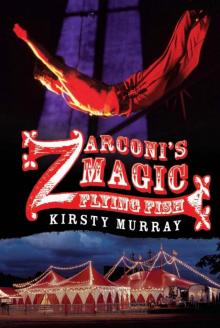 Zarconi’s Magic Flying Fish
Zarconi’s Magic Flying Fish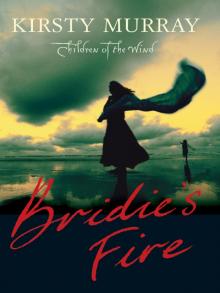 Bridie's Fire
Bridie's Fire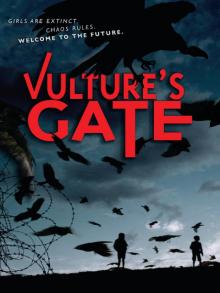 Vulture's Gate
Vulture's Gate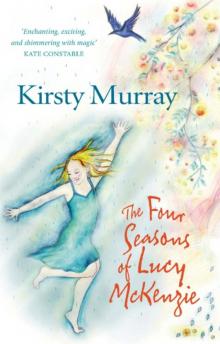 The Four Seasons of Lucy McKenzie
The Four Seasons of Lucy McKenzie A Prayer for Blue Delaney
A Prayer for Blue Delaney The Year It All Ended
The Year It All Ended India Dark
India Dark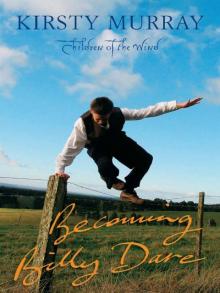 Becoming Billy Dare
Becoming Billy Dare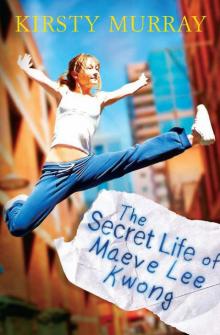 The Secret Life of Maeve Lee Kwong
The Secret Life of Maeve Lee Kwong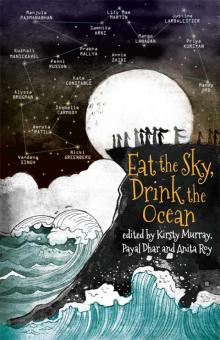 Eat the Sky, Drink the Ocean
Eat the Sky, Drink the Ocean